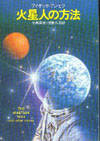Still thinking like an earthling?
Get out of your rut, open your mind—there’s a whole universe waiting. It’s waiting for people who aren’t afraid of thinking in new ways, of doing new things.
Can you imagine…
…mining the skies for water?
…building a new world beneath the surface of a strange planet?
…making pets out of alien explorers?
…putting your life in the hands of a teen-aged computer?
If you can, you’re well on your way to becoming a member of the space generation—you’re thinking The Martian Way.
This is the first of three great Asimov anthologies from the 1950’s, and, in a peculiar way, has had the most influence on me as a person, although I am far from considering the best of the three.
In addition to the title story, there are three novelettes in this anthology—“Youth,” “The Deep,” and “Sucker Bait”. Of the four stories, “The Deep” is probably the slightest. Asimov was rather proud of the fact that in it, he portrayed mother love as a Bad Thing, but beyond that it is unremarkable. (It isn’t actually bad, of course—but neither is it top-notch Asimov.)
Neither is “Youth” all that terribly memorable. It has an unexpected (but basically uninteresting) twist at the end—but is otherwise unremarkable for Isaac Asimov.
As for “The Martian Way,” Asimov was fonder of it than probably the story in and of itself deserves. Granted, it is the strongest of the four (and good, even for Asimov), but Asimov was inordinately proud of two things: one, that he predicted in it the euphoria of the “space-walk,” and two, that in it he had the courage to denounce McCarthyism. Asimov’s opposition of McCarthy should not be discounted, but, as he himself observed, the satire—even with the obvious vilification of “Hilder” as his McCarthy stand-in—managed to go by largely unnoticed.
Still, it’s a good story and has an interesting twist to it. I do rather like it.
This leaves “Sucker Bait,” which has an influence on me quite entirely beyond its quality. It isn’t a bad story, and, in fact, I feel has been rather underrated, even by Asimov himself. It’s main selling point for me, however, has to do with its hero, Mark Annuncio. The fact of the matter is that, as a teenager and preteen, I felt that I personally was Mark Annuncio. Asimov has here perfectly captured the basic loneliness of any child prodigal who is so much smarter (or thinks they are) than all the people surrounding them, even the “smart” ones. (One cannot help but realize that Asimov knew this first-hand.) As a result, I was strongly drawn by Annuncio as a character and, indeed, in the first real science fiction story I myself wrote created a hero from Annuncio’s “Mnemonic Service” to center the story on.
As Asimov goes, the story itself perhaps deserves scant praise—but it is forever a crucial part of my own “golden age,” and something I will forever—forever indeed—remember.
Contents
 |
“The Martian Way” |
 |
“Youth” |
 |
“The Deep” |
 |
“Sucker Bait” |

